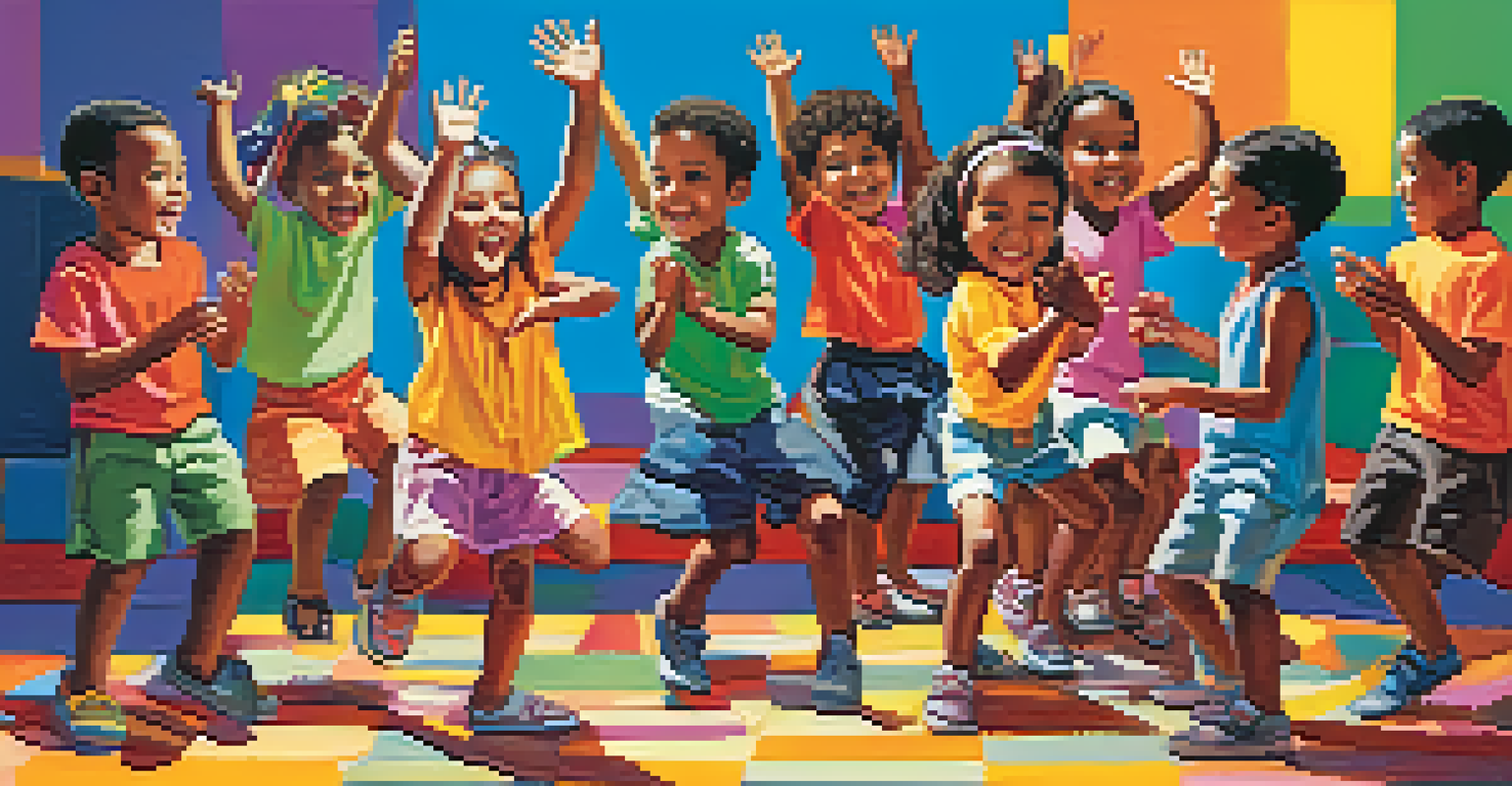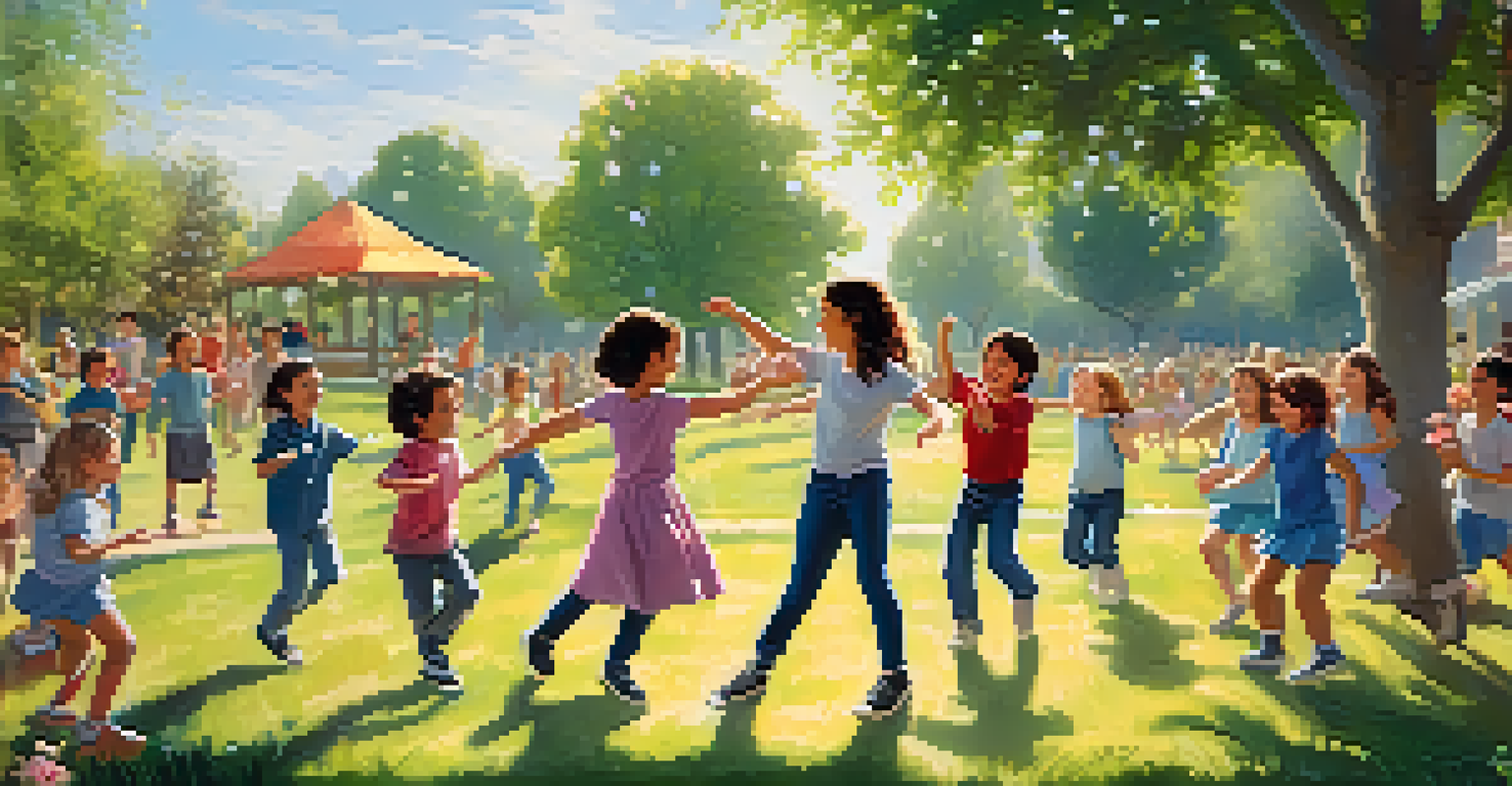How Music Can Aid in the Development of Language Skills

The Connection Between Music and Language Development
Music and language share a fundamental connection that goes beyond mere sound. Both rely on rhythm, melody, and patterns, allowing children to grasp the nuances of communication more easily. For instance, when toddlers sing songs, they’re not just having fun; they're also learning the sounds and structures of their language.
Music can change the world because it can change people.
Research shows that children who engage with music early on tend to develop better language skills. This is because music stimulates the brain areas that are responsible for processing language. When kids learn to differentiate between musical notes, they also learn to recognize different phonetic sounds, which is crucial for speaking and understanding.
Thus, incorporating music into early childhood education can be a powerful tool. By combining songs with spoken language, educators can create a rich environment that nurtures both musical and linguistic skills simultaneously.
Rhythm and Language: A Natural Synergy
Rhythm plays a pivotal role in both music and language, acting as a bridge between the two. Just as a song has a beat that guides the listener, language has its own rhythm that helps convey meaning. For example, children often learn to clap along to the rhythm of a song, which enhances their ability to recognize patterns in spoken language.

Moreover, rhythmic activities, such as chanting or rap, can improve a child's ability to segment words and syllables. This segmentation is essential for reading and writing, laying the groundwork for literacy. When children are encouraged to tap their feet or clap while listening to music, they're essentially honing their linguistic timing.
Music Boosts Language Skills
Engaging with music enhances children's language development by improving their ability to recognize sounds and structures.
By engaging with rhythm, children not only develop a sense of timing in speech but also enhance their auditory discrimination skills. This means they can pick up on subtle differences in sounds, which is vital for effective communication.
Singing: A Fun Way to Learn Vocabulary
Singing is one of the most enjoyable ways for children to expand their vocabulary. Catchy tunes and repetitive lyrics make it easier for kids to remember new words and phrases. For instance, songs like 'The Alphabet Song' or 'Head, Shoulders, Knees, and Toes' engage children and help them learn vocabulary in context.
Where words fail, music speaks.
When children sing, they are also practicing pronunciation and intonation, which are key components of effective language use. The melody serves as a natural cue for the correct pronunciation, making it less intimidating for young learners. It's similar to how a catchy jingle can stick in your mind long after you've heard it.
Additionally, incorporating songs from various cultures can expose children to new languages and diverse vocabulary, broadening their linguistic horizons. This multicultural exposure not only enriches their vocabulary but also fosters an appreciation for diversity in language.
Music and Memory: Enhancing Recall for Language Skills
Music has a remarkable ability to enhance memory, which is crucial for language development. When kids associate words with tunes, they create strong mental connections that make it easier to recall those words later. This is why many people can still remember the lyrics to songs they heard years ago.
For example, using familiar melodies to teach new vocabulary allows children to encode words more effectively in their memory. Songs can act as memory aids, helping children remember not just the words, but also their meanings and contexts. This is particularly helpful in language learning, where repetition and recall are essential.
Rhythm Enhances Listening Abilities
Rhythmic activities foster children's listening skills, which are crucial for understanding and responding in language.
Therefore, employing music in language learning can transform the process from a mundane task into an engaging experience, making the information more memorable and enjoyable for children.
Improving Listening Skills Through Musical Engagement
Listening is a critical part of language acquisition, and music can significantly enhance these skills. Engaging with music requires attention, helping children become more attuned to different sounds and rhythms. Through active listening during music activities, kids develop their ability to focus on verbal communication.
For instance, activities like musical chairs or freeze dance not only make listening fun but also encourage children to respond to auditory cues. This practice sharpens their listening skills, which are essential for understanding spoken language in various contexts.
By fostering good listening habits through music, children can better comprehend instructions, follow conversations, and engage in social interactions. This ultimately leads to improved communication skills and confidence in their language abilities.
Creating a Language-Rich Environment with Music
To support language development, it’s vital to create an environment rich in musical experiences. Parents and educators can play a variety of music, sing songs, and encourage musical play to immerse children in a language-rich atmosphere. This type of environment promotes exploration and encourages children to express themselves through words and sounds.
Incorporating music and movement activities, like dance or rhythm games, can further enhance language learning. These activities not only make learning interactive but also allow children to connect language with physical expression, deepening their understanding.
Social Skills Through Group Music
Participating in group music activities cultivates cooperation and communication, essential for effective language use.
Ultimately, a language-rich environment, combined with music, helps children feel more confident in their communication skills. This foundational support paves the way for lifelong language development and appreciation.
The Role of Music in Social Language Skills Development
Music also plays a significant role in developing social language skills. Group music activities, like singing or playing instruments together, foster cooperation and communication among children. These experiences teach kids how to share ideas, listen to others, and work collaboratively, which are essential components of effective language use.
For example, participating in a choir or a band encourages children to express themselves while also being mindful of others. They learn to negotiate roles, blend their voices, and respond to cues, all of which enhance their social and language skills simultaneously.

By integrating music into group settings, children can practice conversational skills and learn the importance of non-verbal cues, such as body language and facial expressions. This holistic approach to language development nurtures both individual and social communication abilities.